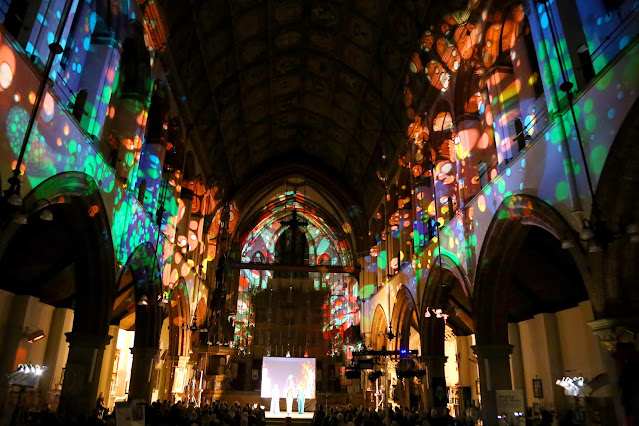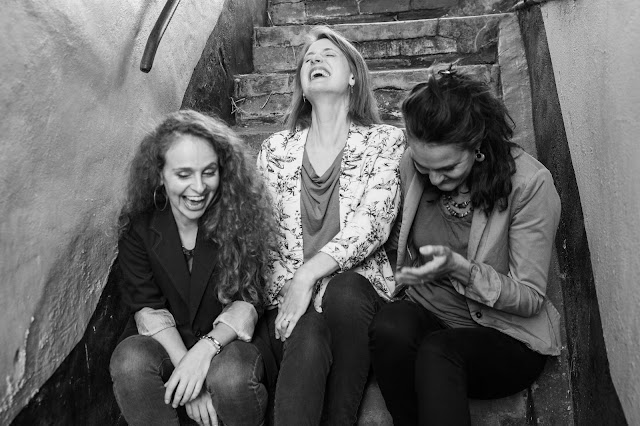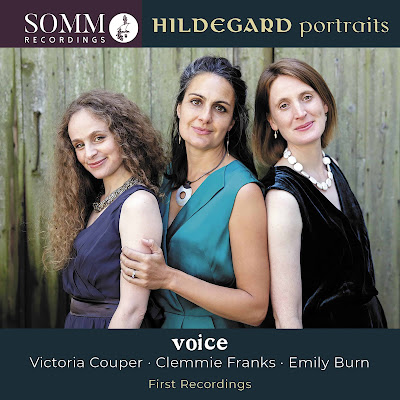 |
| Voice (Victoria Couper, Clemmie Franks and Emily Burn) in Hildegard Transfigured, with visual artist Innerstrings: Chris Tomsett |
Voice is a long-established trio of three female singers, Victoria Couper, Clemmie Franks and Emily Burn. The group has a strong association with the music of Hildegard of Bingen, and their latest disc on the SOMM label, Hildegard Portraits, combines the music of Hildegard with contemporary works inspired by Hildegard by Stevie Wishart, Ivan Moody, Marcus Davidson, Emily Levy, Laura Moody and Tim Lea Young. I recently met up with Victoria, Clemmie and Emily to talk about combining new and old music, and growing up with Hildegard of Bingen's music.
Performing Hildegard of Bingen's music alongside contemporary pieces is something that the group has been doing for so long, that it feels normal. This combination started some 15 years ago when the composer Marcus Davidson heard them singing music by Hildegard and he wrote them a new piece using similar long lines to Hildegard. They enjoyed the combination and performed more contemporary music. Stevie Wishart, with whom the three have a long association, was performing her own music music alongside Hildegard's music with her group Sinfonye, and she wrote them a piece.
 |
| Voice (Victoria Couper, Emily Burn and Clemmie Franks) |
When I ask why the music of Hildegard of Bingen, they respond that it was more a case of Hildegard choosing them. They met whilst they were still at school; though they attended different schools, they were all members of Oxford Girls' Choir and would rehearse with them every Saturday. Stevie Wishart, who was doing her PhD at Oxford, came to the choir as she was looking for children to join Sinfonye. This was because, whilst performing Hildegard's music, she wanted to re-create the sound of the original nunnery with children singing alongside mature women and older ones.
The three said yes. But it was simply a case of 'Do you want to join this fun project', and they agreed and it turned out to be singing the music of Hildegard. They were teenagers, and performing with the group was part of their learning process. So, when they eventually formed a trio, it would have been missing a trick if they did not perform Hildegard. Her music became a learning tool for them in Sinfonye, singing alongside older women. This learning environment was a harmonious family experience. It wasn't just singing Hildegard's music, but working on drones, organum, modes and such over long periods, so they were learning the music and more. It helped them internalise this peaceful and mindful music.
The title of the disc Hildegard Portraits comes from the suite of songs by Laura Moody which form the centrepiece of the disc. The suite reflects Moody's connection with Hildegard which comes from reading her letters, reflecting Hildegard as not just spiritual but a woman of her time, a connection not just to Hildegard's music but insight into her as a human. The commission came about because, Deborah Roberts, artistic director of Brighton Early Music Festival (BREMF), suggested a project to them collaborating with the artist Innerstrings: Chris Tomsett. After this show, the pandemic happened and they continued to explore ideas. They wanted to commission a living female composer to explore Hildegard's personality, not just the sacred texts. Laura Moody did not know Hildegard's music until then, and the pandemic delay meant she delved deeper. The result was a one-hour show with a collaboration with Laura Moody and Innerstrings, Hildegard Transfigured to tell Hildegard's story. And the album has arisen out of the show.
 |
| Voice (Victoria Couper, Clemmie Franks and Emily Burn) in Hildegard Transfigured, with visual artist Innerstrings: Chris Tomsett |
There is another BREMF connection on the disc, as Tim Lea Young's piece arose output of a young composer competition at BREMF, which Tim Young's piece won. Victoria, Clemmie and Emily describe themselves as working with Steve Wishart forever, and she wrote O coruscans lux for them some years ago for the Women of the World Festival. It was written for Voice and community choir, and they multi-tracked it to give the full version though they have also recorded the trio version. They happened to come across Ivan Moody's work and contacted him, finding that he had already written O quam mirabilis. Marcus Davidson, they have known for a while and he has been a great friend of the trio, and their sound has inspired a lot of his work. O Boundless Ecclesia sets an English translation of Hildegard's text and was written for the album, whilst he has produced a new version of Musical Harmony for the album and the piece sets Hildegard's words about the power of music to heal.
They met Emily Levy whilst singing on Oxford Girls' Choir and were singing together in Sinfonye, so that she had the same initiation into Hildegard's music. They commissioned her to write How Sweetly You Burn some years ago; there is a folk influence in the piece which perhaps reflects the way in Oxford Girls' Choir, they sang a range of repertoire including folk and jazz.
Whilst doing the recording they made sure that they did the recording in a space that felt close to a performing environment, so not a studio but a church in Thames Ditton. And, as with their concerts, they move around during the recording. So that, in one piece they start at either end of the church and walk towards the microphone. And for the pieces that they normally perform surrounding the audience, they sang surrounding the microphone to give the listener a more dynamic impression.
As a group, they are keen to avoid labels and the range of repertoire which does not put them in a box, and many festivals are fond of labels. They are pleased that BREMF is happy to programme contemporary music in the mix, Deborah Roberts wants to bring something new, to push the boundaries. They also love collaborating and have done a range of projects with the Early music ensemble, the Dufay Collective. They toured the USA with a programme for three voices and cello with the cellist Matt Haimovitz. Roderick Williams has written them a suite of pieces for three voices and cellos which they are performing with Matthew Sharp, setting words by Ursula Vaughan Williams. They originally met Roderick Williams at the Oxford Girls Choir when he sang Aeneas in performances of Purcell's Dido and Aeneas that the choir sang in.
Outside Voice, they all have busy careers ranging from motherhood to singing with groups such as Joglaresa and Musica Secreta, as well as performing freelance.
The album launch is on 12 July at Spitalfields Music Festival, and they are performing at the Three Choirs Festival, where they are performing Hildegard Portraits, their programme Megaphones for the Unheard. Then in September, they are performing at Medieval Music in the Dales at Bolton Castle.
Beyond the album launch, they have no concrete plans, but they are interested in developing their programme, Megaphones for the Unheard further. The programme started when they commissioned a poet two write poetry about women composers through the ages, and then the programme used pieces inspired by the poetry including works by Stevie Wishart, Helen Chadwick and Ayanna Witter Johnson. They do not feel that they have really explored the programme's potential and so are pleased to be returning to it at the Three Choirs Festival.
Hildegard Portraits - Voice - SOMM Recordings
Hildegard Transfigured - Voice, Innerstrings: Chris Tomsett, Dragonfly lighting - Spitalfields Music Festival at The Dutch Church, Austin Friars, 12 July [tickets]
Hildegard Transfigured - Three Choirs Festival at All Saints' Church, Hereford, 28 July [tickets]
Megaphones for the Unheard - Voice - Hereford Cathedral, 29 July [tickets]
Never miss out on future posts by following us
The blog is free, but I'd be delighted if you were to show your appreciation by buying me a coffee.
Elsewhere on this blog
- Gareth Wilson & choir of Girton College, Cambridge return to the richly textured music of Marc'Antonio Ingegneri for a second disc on Toccata Classics - record review
- Beyond the Garden: Developing an Opera, composer Stephen McNeff explores how he and librettist Aoife Mannix developed their new opera - feature article
- Evoking the Ancien Régime: grandeur & imagination in Jean-Joseph de Mondonville's Grands Motets - record review
- Added depth: Julien Van Mellaerts & James Baillieu mix Die schöne Müllerin with the poems not set by Schubert, read by Christopher Purves, to remarkable effect - record review
- Arun Ghosh's The Canticle of the Sun at the Spitalfields Music Festival - concert review
- New ways of working: composer Andrew Chen has two contrasting pieces at this year's Cheltenham Music Festival - interview
- Unsung Heroines: Lauren Fagan & Opera Holland Park Young Artists in a celebration of women composers and more - concert review
- An exciting rediscovery: Mercadante's Il proscritto proves far more than a museum piece in this thrilling revival from Opera Rara - opera review
- An afternoon delight: Anna Morrisey's inventive production of Rossini's The Barber of Seville at Nevill Holt Opera, in a finely musical performance conducted by Dinis Sousa - opera review
- Poetic drama & real musicality: highly imaginative Rusalka from Jack Furness at Garsington with Natalya Romaniw as a compelling water nymph - opera review
- Obsessed by voices: pianist Dylan Perez on recording the complete songs of Samuel Barber - interview
- Closeness & distance: Friedrich Cerha's evocation of Viennese traditional music in a new version for Viennese Schrammel quartet - record review
- Home












No comments:
Post a Comment